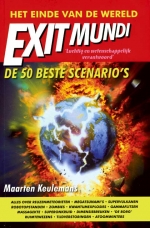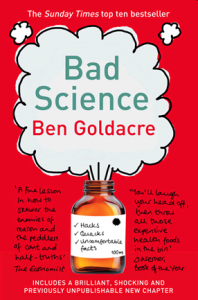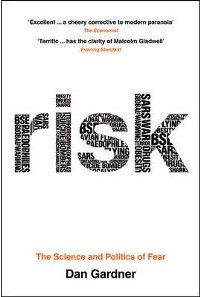 Vandaag wil ik het hebben over Maarten Keulemans. Het moet even, want de laatste tijd duikt hij – zonder dat hij het weet, en zonder bewuste acties van zijn of mijn kant – voortdurend op in mijn leven. Eerst las ik een boek van hem (Exit Mundi, uitstekend werk, kan niet wachten op de film). Toen – ik rolde net uit mijn bed, met dit boek op mijn nachtkastje – mailde hij me met een vraag over overspelige statistieken. Ik weet vrij zeker dat ie me niet geloofde toen ik zei dat ik toevallig net zijn boek aan het lezen was (“Heb je weer zo’n slijmjurk…”). Toch was het waar (echt!).
Vandaag wil ik het hebben over Maarten Keulemans. Het moet even, want de laatste tijd duikt hij – zonder dat hij het weet, en zonder bewuste acties van zijn of mijn kant – voortdurend op in mijn leven. Eerst las ik een boek van hem (Exit Mundi, uitstekend werk, kan niet wachten op de film). Toen – ik rolde net uit mijn bed, met dit boek op mijn nachtkastje – mailde hij me met een vraag over overspelige statistieken. Ik weet vrij zeker dat ie me niet geloofde toen ik zei dat ik toevallig net zijn boek aan het lezen was (“Heb je weer zo’n slijmjurk…”). Toch was het waar (echt!).
 Een tijdje later volgde een tweede toevalligheid. Ik stuurde een mail aan mijn VWN-collega’s waarin ik het boek Bad Science van Ben Goldacre warm aanbeveelde (aanbeval?), waarop Maarten (we kennen elkaar niet, maar ik tutoyeer toch maar, gezien onze warme toevalsrelatie) reageerde met het antwoord dat hij al langer dacht dat Goldacre de nieuwe messias was. Ik kon daar wel mee instemmen. Een paar weken later, alweer zo’n vreemd toeval: Maarten raadt alle collega’s het boek Risk aan, van Dan Gardner. Verplichte kost, noemt hij het. En ik zweer het: twee minuten later belt de postbode aan, met in zijn hand het drie dagen daarvoor door mij bestelde exemplaar van… juist.
Een tijdje later volgde een tweede toevalligheid. Ik stuurde een mail aan mijn VWN-collega’s waarin ik het boek Bad Science van Ben Goldacre warm aanbeveelde (aanbeval?), waarop Maarten (we kennen elkaar niet, maar ik tutoyeer toch maar, gezien onze warme toevalsrelatie) reageerde met het antwoord dat hij al langer dacht dat Goldacre de nieuwe messias was. Ik kon daar wel mee instemmen. Een paar weken later, alweer zo’n vreemd toeval: Maarten raadt alle collega’s het boek Risk aan, van Dan Gardner. Verplichte kost, noemt hij het. En ik zweer het: twee minuten later belt de postbode aan, met in zijn hand het drie dagen daarvoor door mij bestelde exemplaar van… juist.
Dit wordt haast eng. Dus, sorry Maart en, ik maak er een eind aan. En rigoreus ook. Want volgens mijn voortschrijdend inzicht zie je het helemaal fout. Ben Goldacre is maar een soort hulp-messias. Die echte Ene is duidelijk Nick Davies, en wel hierom. Zijn visie op neutraliteit en objectiviteit is zo zuiver, juist en doordacht dat het alleen maar het Ware Woord kan zijn. En zijn boek Flat Earth News is overduidelijk de nieuwe bijbel. Om duidelijk te maken waarom, maak ik even riant gebruik van het citaatrecht:
en, ik maak er een eind aan. En rigoreus ook. Want volgens mijn voortschrijdend inzicht zie je het helemaal fout. Ben Goldacre is maar een soort hulp-messias. Die echte Ene is duidelijk Nick Davies, en wel hierom. Zijn visie op neutraliteit en objectiviteit is zo zuiver, juist en doordacht dat het alleen maar het Ware Woord kan zijn. En zijn boek Flat Earth News is overduidelijk de nieuwe bijbel. Om duidelijk te maken waarom, maak ik even riant gebruik van het citaatrecht:
© Asha ten Broeke. Alle rechten voorbehouden.The great blockbuster myth of modern journalism is objectivity, the idea that a good newspaper or broadcaster simply collects and reproduces the objective truth. It is a classic Flat Earth tale, widely believed and devoid of reality. It has never happened and never will happen because it cannot happen. Reality exists objectively, but any attempt to record the truth about it always and everywhere necessarily involves selection, by using the kind of judgements* that Harry Evans describes. In this sense, all news is artifice. (p 111)
* Eerder in het hoofdstuk gaat het over deze oordelen: Judgements have to be made about what’s important. They are moral judgements. (…) These judgements are not optional extras. They are not shameful lapses. They are essential, unavoidable, constant requirements of every journalist on every story – to select this subject and not another, to choose this angle instead of the alternatives, to use this headline, this intro, this language, while rejecting others. (p 111)
Op de volgende pagina vervolgt Davies: Media managers (…) enjoy the comfort of life behind the myth of objectivity. It allows them to pretend that they have a special claim to the truth. In reality, what they generally promote is not objectivity at all. It’s neutrality, which is a very different beast.
Neutrality requires the journalist to become invisible, to refrain deliberalety (under threat of discipline) from expressing the judgements which are essential for journalism. Neutrality requires the packaging of conflicting claims, which is precisely the opposite of truth-telling. If two men go and mow a meadow and one comes back and says ‘The job is done’ and the other comes back and says ‘We never cut a single blade of grass’, neutrality requires the journalist to report a controversy surrounding the state of the meadow, to throw together both men’s claims and shove it out to the world with an implicit sign over the top declaring, ‘We don’t know what’s happening – you decide.’ Traveling under the alias of objectivity, this approach has become respectable. (p 112)
Verderop in het hoofdstuk gaat Davies in op hoor en wederhoor als ‘neutraliteitsinstrument’: ‘Always give both sides of the story’ – this is the safety net rule. It suggests that, if all else fails (…) you bang in some quotes from the other side to ‘balance’ the story. Balance means never having to say your sorry – because you never haven’t said anything. Applied to statements of opinion, this rule is fine. But applied to statements of fact, the rule is the embodiment of neutrality and with the same result, that journalists are encouraged to abandon their primary purpose, of truth-telling. (p 131)
Davies geeft een aantal voorbeelden uit de wetenschapsjournalistiek: Scientists spent two decades warning that the planet was heating up while journalists simply balanced what they were saying with denials from experts and oil companies. It was the same years ago when scientists tried to warn that smoking was linked to lung cancer, and journalist simply balanced their evidence with counterclaims from the tobacco industry. It was the same again in May 2006, when thirteen of the most senior doctors in Britain, including a Nobel Prize-winner and the president of the Academy of Sciences, wrote a public letter calling on the government to stop funding homeopathy and other ‘unproven or disproved treatments’. The journalists immediately reached for a homeopath who denounced the doctors’ letter snappily as ‘medical apartheid’ and the facts were soon buried in balance. The truth? Not our job. (p 131)